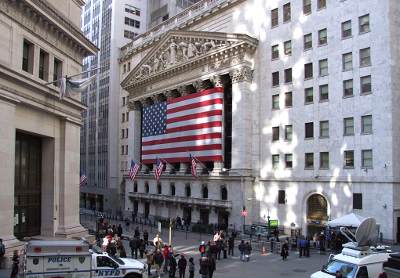Advanced level English
USA - American life
Wall Street Culture - the heart of America
For many Americans, the most important street in the USA is Wall Street
 The New York Stock Exchange, on
Wall Street.
The New York Stock Exchange, on
Wall Street.
Say
"the streets of New York" to a non-American, and
he'll probably think
of Times Square, Madison Avenue or Broadway;
but mention the subject to
an American and for many
the first name that comes
to mind will
be Wall
Street.
For many, Wall Street is indeed just
"the street", probably the most important street in the USA or even in
the world, as what goes
on on Wall Street, more perhaps than what goes
on in Congress, can have a direct influence on the lives of everyone in
the USA, if not most people in the world.
Wall Street is of
course the home of the
New York Stock
Exchange, the financial heart of the American business
world. Each day, billions of dollars of shares are traded on the floor
of the stock exchange on
behalf of companies, pension funds and private
individuals wanting to protect their investments or their life's
savings, and make sure
that they too are on the bandwaggon
of
prosperity.
 Wall Street's ups and downs
affect the lives of most Americans
Wall Street's ups and downs
affect the lives of most Americans
The New York Stock Exchange is the
biggest and most active stock exchange in the world; over half of all
adult Americans have some, if not all, of their savings invested
directly on Wall Street, so
it is not surprising that the fluctuations
of the Street's famous indexes, the Dow Jones and the Nasdaq, are
followed daily by millions of ordinary Americans. When
the Dow and the
Nasdaq are on a rise, millions of Americans feel more prosperous; when
they are falling, millions start feeling worried about their financial
security and their retirement
years. Yet
more importantly, when
Wall
Street booms it is a sign that the American economy is booming,
creating jobs and prosperity for people throughout the nation; when
Wall Street slumps for more than a short period, it is because the
American economy is slowing down, putting investment and jobs at risk.
Nevertheless,
in spite of its periodic
crashes and downturns, most Americans know very well that by investing
directly in the stock market, they are probably ensuring the best
possible long term return on their investments.
Over time, direct investments on Wall
Street have always done better than most other forms of long-term
placement, and logically
speaking this is inevitable. Ultimately, most
forms of investment depend on the performance of the US economy in
general, and by investing
directly on Wall Street, American investors
are simply ensuring that they personally take full advantage of the
growth of the stock market, rather
than share their gains with banks,
investment trusts or other intermediaries offering investment services.
CRASHES ON THE STREET
Discover grammar in a new light
"A breath of fresh air" - IATEFL Voices

Print & ebook from Amazon,
Print book from Barnes & Noble, Waterstones & other good bookshops
The risk of a crash on Wall Street is a
reality that must always be borne
in mind: Wall Street "crashed" most
spectacularly in the fall of 1929, when
share values dropped over 50%
in the space of a few days. By the time
the fall bottomed out
in
1932,
over 80% had been "wiped off" the value of shares on the American stock
market, and the Great
Depression had begun.
Before 1929, as the stock market boomed,
over a million Americans had been speculating on the Street, borrowing
money that they did not have in order to buy shares for sale at a
profit. When the crash
came, hundreds of thousands of these
speculators, both individuals and companies, went bankrupt, causing
immense distress and poverty.
More recently, Wall Street crashed in
2007 - 2008, almost triggering
a collapse of the world
financial system. When
the stock market eventually stopped falling in
March 2009, it had lost 54% of its value, and
many people had lost
their life's savings.
Previously in 1997, almost over a third
of its value was wiped out in a few
days; but this time the
consequences were less dramatic. While
most
Americans saw the value of their savings tumble, few went bankrupt as a
result.
In
today's America, borrowing money solely
for the purpose
of
speculating on Wall Street is not a common habit, so
the money that was
"lost" in recent crashes was mostly money that people owned
themselves, not money that they owed to someone else.
One day no doubt, in some unforeseen
future, Wall Street will crash spectacularly again; but when that
happens there will have to be both a cause and an effect. The most
likely cause
will be a major world crisis; the most likely effect,
given today's "global economy", will be a major economic catastrophe
around the world, perhaps similar to the hyperinflation that affected
Germany under the Weimar republic.
If that happens, society as we know it
will grind to a halt,
and most forms of saving,
except perhaps gold and
real estate,
will lose most of their value; until that day, Wall Street
will remain as one of the nerve centers of the global economy.
WORDS
be
on the bandwagon: be part of -
bear in mind: remember
-
comes to mind: he
thinks of - distress:
alarm - fluctuation:
ups and downs - grind
to a halt: stop
- likely: probable
- on behalf
of: for
- plummet: fall
sharply - purpose: reason
- real estate: land
and buildings - retirement
years: years when one no longer works -
share: investment, bond - slump: go
downhill, fall - solely:
just -
stock:
share, investment - trade:
buy and sell - tumble:
fall
Copyright notice.
This resource is © copyright Linguapress 2000 . Updated 2023. Based on an article originally published in Spectrum magazine.
This text may not be reproduced on other websites nor in printed form without written permission from the publishers. Reproduction is authorised exclusively for personal use by students, or for use by teachers with their classes.
Student worksheet
Word endings. Replace all the missing endings in this extract from the article.
Some of the endings test your grammar, others test spelling, and a few test if you have learned all the vocabulary.
Before 1929, as the stock market boo, over a million Americans had been specula on the Street, borro money that they did not, have in order to buy shares for s at a profit. When the crash c, hundr of thousands of these speculat both individ and companies, went bank, caus immense distress and pov.
More recen, Wall Street crash in 2007 - 2008, almost trigge a collapse of the world financ system. When the stock market event stopped fa in March 2009, it ha lo 54% of its value, and many people ha lo their life's sav.
Previ in 1997, almost a th of its value was wiped out in a few days; but this time the consequ were less dram. While most Americans saw the value of their sav tum, few went bank as a result.
For teachers:
Gap fill exerciseThis exercise tests a) memory, b) spelling and c) grammar.
Conjunctions and connectors
This text includes a number of examples of conjunctions and connectors. These include the coordinating conjunctions and, but, and yet, and subordinating conjunctions as, so, when, rather than
© linguapress.com


 Copyright
information.
Copyright
information.